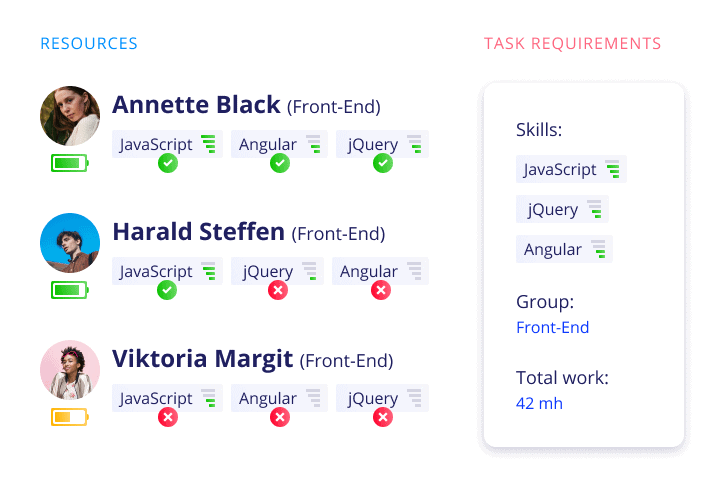In the previous article, we’ve reviewed the most prominent trends that are expected to impact the aerospace and defense industry this year. In turn, they will affect the way its projects will be managed. So, in this article, we’ll focus on the A&D project and resource management challenges stemming from the current trends in the industry and examine the ways to address them.
Project Management Challenges in the Aerospace & Defense Industry
Before we start exploring the difficulties that A&D organizations face when managing their projects, let’s take a look at the general characteristics of the aerospace sector. So, what is aerospace and defense? According to the aerospace and defense industry research, it involves organizations that are defense contractors, commercial ones, or both. This means that aerospace manufacturers and defense companies mostly deal with design and developments, manufacturing, and providing services, and consequently work on R&D, manufacturing, and commercial projects.
Now, let’s consider what challenges in aerospace industry current trends add to the A&D project management.
Managing multiple projects running concurrently
As the A&D industry together with the commercial aviation sector are expected to develop and grow (e.g., increased demand for weapons as a result of Russian invasion of Ukraine; the development of defense mergers and acquisitions activity; space market growth; research and development, testing and application of innovative technologies and equipment, etc.), the number of projects underway in the aerospace and defense organizations will be increasing. In other words, one of the biggest challenges is increased consumer demand. So, the ever-increasing number of projects is the biggest one among aerospace and defense industry challenges. The new projects in the A&D companies are expected to be piling up every now and then. In turn, managing multiple projects involves dealing with dependencies between them and maximum efficient utilization of shared resources, so that you won’t only have a sum of successful projects, but a successful business.
Bringing distributed teams together
Projects are becoming increasingly international across industries, which is explained by globalization as well as remote work trends. As the boundaries between countries tend to be erased, and there are a variety of technical solutions enabling online communication, companies have got an opportunity to hire experts from around the globe. The A&D organizations are no exception. But along with new opportunities, these trends bring challenges too: e.g. a resource manager must keep track of a huge amount of data related to thousands of employees working on hundreds of projects from various corners of the world, let alone cultural and time zone differences and a lack of in-person interaction. Coordination and management of distributed resources requires additional efforts, otherwise, the efficiency of their work won’t be high.
Dealing with uncertainty
Managing projects in any industry involves dealing with some uncertainty. The same can be said about aerospace companies and defense organizations: changes in geopolitical situation, in particular, Russia-Ukraine war and related challenges; consequences of the pandemic crisis; natural disasters; shipping delays; aerospace supply chains challenges; and even the application of technological innovations – these are just a few examples of challenges aerospace businesses are facing. These and other factors may lead to unpredictable events that will harm the whole multi-project environment within a company. Let’s consider the example. If a project requires the application of cutting-edge technology or equipment (e.g., as part of digital tread or smart factory implementation), you cannot be sure that this process will run smoothly. It may take more time for employees to master the new equipment or get used to the new standards of work. In addition, there’s always Murphy’s law affecting your project environment. These factors may significantly increase a project’s lead time, but it’s something you cannot estimate with the accuracy of an hour.
Read more: Dealing with Murphy’s Law in Project Management: How to Protect Your Projects from Failure
Lack of skilled resources for aerospace and defence project management
The implementation of the latest technologies, which is one of this year’s technology trends for the A&D industry, including the commercial aerospace sector, requires human resources with corresponding skills. However, as stated by McKinsey, aerospace and defense organizations are facing skills shortage challenges, including the following ones:
- increased competition for employees with technological skills in aerospace realm,
- growing demand for workers with specific skills who will be capable of dealing with latest technological solutions,
- the number of employees with the above-mentioned skills is lower than that of those who are reaching the age of retirement.
Obviously, talent shortage and skills gap challenges for businesses will lead to difficulties with staffing projects with the right resources, especially when it comes to those projects or tasks which require the application of innovative technologies.
Cyber threats
Aerospace and defense industry is even more attractive for cyber criminals than any other sector, which makes it subject to frequent cyber attacks, breaches, or advanced persistent threats. It poses a great challenge for businesses in the defense sector and aerospace manufacturing: any project involves collecting and storing certain sensitive data that can be vulnerable to cyber attacks and requires a company to have advanced cybersecurity technology. Therefore, digital transformation in aviation sector results not only in improved performance and outcomes but also in cyber threats that create serious risks for projects and related data and can even lead to their complete failure.
How to Address Challenges in A&D Projects

Overcoming the above-mentioned difficulties requires well-thought project and resource management actions. Here are some of them.
Setting right priorities across all projects
As defense production is increasing day by day, the challenge of managing multiple projects with a shared resource pool becomes of extreme importance. Managing multiple projects simultaneously is impossible without determining what matters most for the moment. That is why the project with the most critical constraints should be taken care of first. Prioritization is no less important for the members of a project team: when they focus on the most important tasks, they won’t be overloaded and will avoid bad multitasking, which in turn will increase their efficiency.
Read more: How to Overcome 3 Major Challenges in Managing Multiple Projects
Addressing uncertainty
One of the actionable tools to cope with uncertainty in project management is adding a time buffer – in this case, the possibility of missing dues dates is minimized if something goes wrong.
Learn more about the ways to cope with uncertainty: Fighting Uncertainty in Project Management: Arm Yourself with the Right Tool
The other important thing is proper risk management. Instead of being optimistic concerning a project’s workflow, it’s better to be prepared for at least principal risks that can be predicted and stay in line with the production constraints.
Participating in cyber security risk management
Firstly, it’s important to analyze the customers’ data that is stored on the company’s servers, the devices used for that, and assess corresponding risks. Also, project managers can determine if a project is subject to cyber threats by analyzing a company’s previous experience and exploring attacks on competitors in the industry. Secondly, they should take these risks into account when planning a project. It’s a good idea to prepare for possible attacks and develop a plan that can be used in case something goes wrong. Thirdly, when adopting any additional software solutions, it’s important to make sure that they guarantee the safety of all the data you input and address the principal risks associated with project data.
Utilizing project and resource management solutions for multi-project environments
Among modern digital technologies, project and resource management software solutions combined with a good project/resource management strategy and effective business strategies can greatly contribute to seamless and efficient flow of projects at aerospace industry and a defense firm: from creating schedules automatically to forecasting future bottlenecks.
In line with the above-mentioned solutions to PM challenges in aviation industry, we can touch upon Epicflow, the multi-project resource management software. Designed specifically to make multiple projects’ orchestration easier and more efficient, Epicflow offers the following ways to handle the challenges listed above.
Clear prioritization of projects and tasks
Epicflow’s Task List presents a list of automatically prioritized tasks across the whole multi-project environment. It brings the most important tasks to the top, so that every project team member knows what tasks require their focus first and foremost. What is important is that it shows real-time updates, and if any changes occur, the list of tasks will be automatically reprioritized.
In addition, you can review the state of your multi-project environment in the Pipeline, where projects are marked with corresponding colors depending on their importance. So you’ll always be in the know as to the projects that require most of your attention.
Centralized resource management
Working with distributed teams in the aviation industry, it’s extremely important to tap into all the employees’ skills. Epicflow’s Competence Management provides the ability to add competences and their level to each team member, and mark their capacity as well. So, no matter how far they are located from one another, all the information required for resource allocation is kept in one place. Besides, it can work like a resource allocation advisor, suggesting employees with the right competences and availability for completing a project task.
What’s more, Epicflow supports features that let you manage not only human resources but also equipment and raw materials that are an inevitable part of production.

Informed decision-making
Dealing with uncertainty and assessing risks, you may need to analyze different scenarios. For example, what will happen if I add one more project? Won’t my resources be overloaded? Will we be able to deliver current projects on time? Artificial intelligence plays a significant role here because predictive analytics lets companies forecast the biggest risks and take measures to mitigate them. With Epicflow’s features based on predictive analytics it becomes possible: What-If Analysis allows you to change various parameters and see how they will affect a project’s flow; the Future Load Graph gives an insight into your resources’ future workload based on their current tasks and makes it possible to adjust the workflow in such a way that they won’t be either overloaded nor idle.
Ensuring data safety
We are responsible for the safety of the data imported into the Epicflow system, which complies with EU General Data Protection Regulation (GDPR).
- Your personal information is guarded within our secured networks.
- Only a limited number of people who have special rights, and bound by NDA, Law restriction and additional Security organizational and technical measures can access this information, and they will keep it confidential.
- We maintain the safety of your personal information with implemented security measures after you submit any data.
For more information, you can visit our Privacy policy web-page.
There are much more opportunities for streamlined project orchestration with Epicflow. Book a call to learn how to reach a competitive advantage with just one solution.

